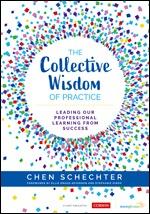The Collective Wisdom of Practice: Leading Our Professional Learning From Success
Many professional learning designs are built on the assumption that we learn best by studying our failures. However, learning from failure often evokes responses of denial, avoidance and the same defensive dynamics that contributed to the failure in the first place. Schechter’s resource, presents the Collective Learning-from-Success approach. This fresh, new, assets-based framework will shift educators’ minds from focusing in isolation on failure to continuously deliberating together, sharing past experiences and best practices, and solving problems related to teaching and learning. Whether you serve as a teacher, school or district leader, or a policy maker, your professional growth will benefit by reflecting on actionable knowledge through collective inquiry.
This book offers educators an opportunity to come together in forming a productive alternative to the learning from failure paradigm. The Collective Wisdom of Practice provides a model for how to learn from successes by providing
- An assets-based approach to designing and implementing professional learning
- Strategies to focus on learning from educators’ past successes
- Multinational case studies, sample learning materials, templates, and tools
- A framework that can be applied to multiple levels, such as grade and subject areas, building level, system level, and policy level
Grounded in more than 20 years of extensive research in the US and internationally, this approach will have a powerful influence on professional learning. Learn to nurture your wisdom of practice to meet the challenge of preparing students to be co-creators of society.
Disclaimer:
This website may contain links to both internal and external websites. All links included were active at the time the website was launched. SAGE does not operate these external websites and does not necessarily endorse the views expressed within them. SAGE cannot take responsibility for the changing content or nature of linked sites, as these sites are outside of our control and subject to change without our knowledge. If you do find an inactive link to an external website, please try to locate that website by using a search engine. SAGE will endeavour to update inactive or broken links when possible.


